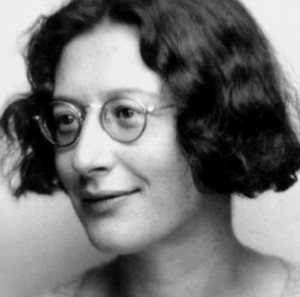“Todos los pecados son intentos de llenar vacíos.”
Fuente: [Albaigès Olivart] e [Hipólito] (1997), p. 364.
Fuente: La pensateur et la grâce, 1975.
Simone Weil fue una filósofa francesa.

“Todos los pecados son intentos de llenar vacíos.”
Fuente: [Albaigès Olivart] e [Hipólito] (1997), p. 364.
Fuente: La pensateur et la grâce, 1975.
“Para que tu mano derecha ignore lo que hace la izquierda, habrá que esconderla de la conciencia.”
Fuente: [Albaigès Olivart] e [Hipólito] (1997), p. 259.
Fuente: [Albaigès Olivart] e [Hipólito] (1997), p. 195.
War and the Iliad
Fuente: [Albaigès Olivart] e [Hipólito] (1997), p.345 . Citado por W. H. Auden en A Certain World
Fuente: ¿Sería posible una vida sin partidos políticos? http://www.votoenblancocomputable.org/index.php/13-info/academic/54-apoyaria-simone-weil-a-escanos-en-blanco-en-busca-de-la-democracia-participativa
Réflexions sur les causes de la liberté et de l'oppression sociale, 1934
Fuente: Sobre la ciencia (citando La ciencia y la hipótesis de Poincaré).
Fuente: Weil, Simone. Edit. El cuenco de plata, 2006; pág. 16 https://books.google.es/books?id=LaM2DNTfMDcC&pg=PA30&dq=No+hay+nada+m%C3%A1s+c%C3%B3modo+que+no+pensar.+simone+weil&hl=es&sa=X&ved=0ahUKEwjnyYvLif7mAhXZBGMBHUljDlwQ6AEIOTAC#v=onepage&q=c%C3%B3modo&f=false; ISBN 9871228244.
Fuente: La Science et l'hypothèse ( La ciencia y la hipótesis), París, Flammarion 1902. Madrid, Espasa, 2002.
Fuente: [Albaigès Olivart] e [Hipólito] (1997), p. 364.
Fuente: Escritos históricos y políticos
Fuente: [Albaigès Olivart] e [Hipólito] (1997), p. 125.
Fuente: The need for roots
“La desgracia de los otros entró en mi carne.”
Fuente: Gamoneda, Antonio. Blues castellano (1961-1966). 1.ª ed. Aeda, colección de poesía; editorial Noega, Gijón, 1982; ISBN 8486015057. Página 9.
Fuente: [Albaigès Olivart] e [Hipólito] (1997), p. 589.
Fuente: La pensateur et la grâce, 1975.
Selección de reflexiones y postulados
Fuente: [Albaigès Olivart] e [Hipólito] (1997), p. 143.
Fuente: Lectures on Philosophy
“The sea is not less beautiful in our eyes because we know that sometimes ships are wrecked by it.”
Fuente: Waiting for God
“Absolutely unmixed attention is prayer.”
Fuente: Gravity and Grace
“He who has not God in himself cannot feel His absence.”
Fuente: Gravity and Grace
“Art is the symbol of the two noblest human efforts: to construct and to refrain from destruction.”
The Pre-War Notebook (1933-1939), published in First and Last Notebooks (1970) edited by Richard Rees
“Sin is not a distance, it is a turning of our gaze in the wrong direction.”
Fuente: Waiting for God
“The most important part of education — to teach the meaning of to know”
in the scientific sense
The last statement in her notebook
Waiting on God (1950)
“If we love God while thinking that he does not exist, he will manifest his existence.”
Fuente: Simone Weil : An Anthology (1986), Detachment (1947), p. 260
Fuente: Gravity and Grace
Fuente: Simone Weil : An Anthology (1986), Love (1947), p. 270
“Action is the pointer which shows the balance. We must not touch the pointer but the weight.”
L’action est l’aiguille indicatrice de la balance. Il ne faut pas toucher à l’aiguille, mais aux poids.
La pesanteur et la grâce (1948), p. 57
Fuente: Gravity and Grace (1947), p. 97
“Alexander is to a peasant proprietor what Don Juan is to a happily married husband.”
Fuente: Gravity and Grace (1947), p. 78, (1972 edition)
Fuente: Simone Weil : An Anthology (1986), The Iliad or The Poem of Force (1940-1941), p. 181
Fuente: Simone Weil : An Anthology (1986), Contradiction (1947), p. 240